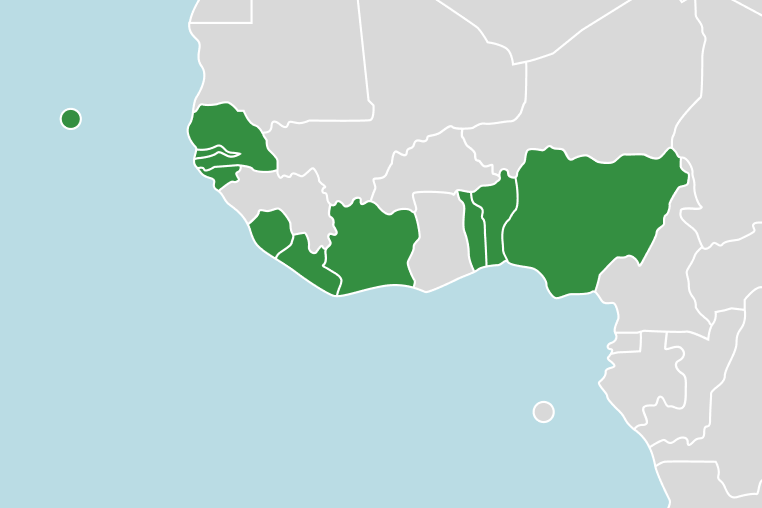ECOWAS and the AfCFTA

The African Continental Free Trade Area (AfCFTA), under which trading began in January 2021, seeks to create a major economic and technological transformation across Africa’s 54 countries (all AfCFTA signatories) at national and regional levels. This transformation is expected to come through using and adding value to Africa’s diverse resources, within the context of deeper regional integration.
The AfCFTA seeks to address Africa’s development challenges by progressively moving from the continent being driven by unskilled labour and natural endowments to an investment- and efficiency-driven approach, and ultimately to a high level of growth driven by knowledge, innovation and business sophistication.
Currently, trade among African countries accounts for 14.9% of their total trade, according to the African Export-Import Bank’s 2024 African Trade Report.
This figure is considerably lower than that of trade within other regions or continents, including Europe and North America, which have intra-regional trade rates of over 60%. The United Nations Economic Commission for Africa estimates that the AfCFTA could increase trade among African countries by as much as USD55 billion – a jump of more than 75% from current levels – by 2045.
The AfCFTA is expected to boost the GDP of the Economic Community of West African States (ECOWAS) to approximately USD3.3 trillion by 2043, which represents an increase of about USD1.3 trillion compared to the current trajectory, according to the Institute for Security Studies.
The institute anticipates that by 2043, ECOWAS’s manufacturing sector will see gains of approximately USD110.3 billion, while the services sector could benefit by about USD397.6 billion, compared to current projections. This growth will be driven by enhanced demand and reduced costs for raw materials, promoting local industries.
ECOWAS is actively preparing for full AfCFTA implementation through a series of strategic initiatives aimed at enhancing regional integration and economic cooperation among its member states.
These include developing an ECOWAS implementation strategy and building capacity within the region’s member states. The ECOWAS-ITC SheTrades AfCFTA project has been instrumental in training women traders across several member states, reflecting a commitment to ensuring gender inclusivity in trade initiatives.
GIZ’s assistance to ECOWAS focuses on enhancing the institutional and regulatory frameworks necessary for successful trade integration among the region’s member states.
Here are the key areas of GIZ’s support:
Technical assistance and capacity building
To support trading under the AfCFTA, GIZ arranges technical assistance to the ECOWAS Commission, relevant ministries and local agencies. This includes direct support for developing regional policies and implementing necessary measures for AfCFTA compliance. GIZ also conducts training sessions for members of AfCFTA implementation committees and government agency employees, equipping them with the skills needed to effectively execute their roles in the AfCFTA framework
Enhancing coordination and negotiation
GIZ collaborates with ECOWAS to help member states find common negotiating positions in AfCFTA discussions
Developing an implementation strategy
GIZ is assisting ECOWAS in creating a common AfCFTA implementation strategy, tailored to the specific needs and challenges of member states to facilitate smoother integration into the continental market
Trade information access
GIZ supports the development of user-friendly trade information portals at ECOWAS and member state levels. These portals aim to provide up-to-date information on trade regulations. GIZ is also collaborating with ECOWAS on raising awareness among private sector participants about the opportunities presented by the AfCFTA
Developing a regulatory framework
GIZ is working with ECOWAS to improve the regulatory frameworks necessary for AfCFTA implementation. This includes addressing existing gaps in trade facilitation, customs processes and legal standards that hinder effective regional integration
Through these comprehensive efforts, GIZ is playing a crucial role in strengthening ECOWAS’s capacity to implement the AfCFTA, thereby promoting greater economic integration and trade facilitation across West Africa.
Facts and figures
The AfCFTA will help ECOWAS member states boost their intra-African trade.
Total intra-ECOWAS trade increased by an average of 18% per year between 2005 and 2014.*
As of recent estimates, total trade within ECOWAS is approximately USD208.1 billion, with a significant portion directed towards external markets*
*African Trade Report 2023
Our partners in ECOWAS
Political partner: ECOWAS Secretariat
